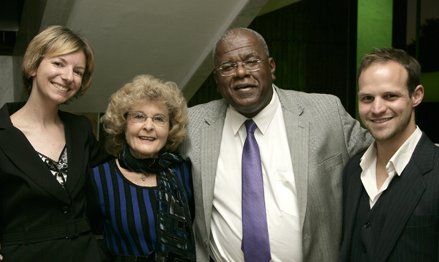Latest News Archive
Please select Category, Year, and then Month to display items
28 October 2024
|
Story Zingaphi Mdletshe
|
Photo Supplied
 Kovsie ACT volunteers undergo leadership and skills training, preparing them to engage in community service and develop sustainable solutions to societal challenges beyond university life.
Kovsie ACT volunteers undergo leadership and skills training, preparing them to engage in community service and develop sustainable solutions to societal challenges beyond university life.
The University of the Free State’s (UFS) Kovsie ACT office continues to foster a spirit of humanity among students through a leadership and skills development training initiative that is aimed at not only developing them as volunteers but also as conscientious individuals who understand the value of helping others.
“The leadership and skills development training is a platform that the ACT office utilises to ensure that volunteers are equipped with the necessary skills needed to fulfil their duties as Central ACT Committee members, thereby facilitating a smooth term,” said Teddy Sibiya, Senior Assistant Officer at Kovsie Support Services. “We aim to impart knowledge that will be beneficial during their term and beyond their involvement with the ACT office.”
Touching on how the training aligns with the broader goals of the Kovsie ACT Volunteer Programme for the term 2024/2025, Sibiya emphasised that sustainability has always been at the heart of Kovsie ACT and that their activities provide opportunities for students to engage in community service and participate in environmental initiatives to assist civil society organisations. The programme also encourages students to become active global citizens by addressing transnational issues such as food insecurity and socio-economic challenges.
“I am excited about the opportunity to be part of a movement that influences not just the lives of students but also reaches beyond the university, promoting innovative and sustainable solutions on a larger scale,” said Raylene Bussack, a Central ACT Committee volunteer. “My goal is to inspire and empower others to join us in this vital work to make a lasting difference together.”
In addition to leadership training, Kovsie ACT offers various programmes designed to enhance students' skills in areas such as communication, teamwork and project management. These skills are essential for their roles within Kovsie ACT and for their future careers. By participating in community service projects, students build valuable relationships and gain practical experience that will benefit them upon graduation. The initiative ultimately aims to create a culture of giving back among students while enriching their university experience.
'England, the English and the problem of education in South Africa.’
2013-09-26
|
 |
Attending the lecture were, from the left: Dr Susan Brokensha, Senior Lecturer: Department of English; Prof Rosemary Gray, Professor Emeritus (Honorary Life Vice-President of the English Academy of Southern Africa); Prof Jonathan Jansen; and Dr Thinus Conradie, Lecturer: Department of English.
Photo: Johan Roux
26 September 2013 |
Prof Jonathan Jansen: Lecture
The university celebrated the life of one of South Africa's most renowned art critics, hosting the 2013 English Academy’s Percy Baneshik Memorial Lecture on the Bloemfontein Campus.
The keynote lecture was delivered by Prof Jonathan Jansen, Vice-Chancellor and Rector, who joined a distinguished list of speakers to have delivered the lecture. Presented annually by the English Academy of Southern Africa, an association dedicated to promoting the effective use of English as a dynamic language in Southern Africa, past speakers include Prof Es’kia Mphahlele, Prof Njabulo Ndebele, Dr Alan Paton and Prof Albie Sachs. The lecture is hosted at venues across the country and this year Bloemfontein paid tribute to Percy Baneshik.
In his speech Not even colonial born: England, the English and the problem of education in South Africa,' Prof Jansen addressed the dilemma of the politics of language in both school and university education today.
Talking about the dominance of English in schools, Prof Jansen said it is the language of choice because indigenous languages are so poorly taught. "Simply learning in your mother tongue is absolutely no guarantee of improved learning gains in school. The problem is not the language of instruction; it is the quality of teaching, the knowledge of curriculum and the stability of the school."
Prof Jansen told the audience in the CR Swart Hall that Afrikaans-exclusive, or even Afrikaans-dominant white schools represent a serious threat to race relations in South Africa. "You simply cannot prepare young people for dealing with the scars of our violent past without creating optimal opportunities in the educational environment for living and learning together."